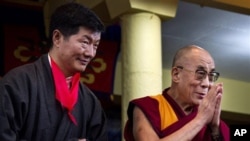Tibetan exiles have inaugurated a new prime minister. Lobsang Sangay, a Harvard educated legal scholar, is the first democratically elected leader to take office since Tibetan spiritual leader, the Dalai Lama, retreated from political duties.
Traditional music and marchers hailed the Dalai Lama and other Tibetan exile leaders as they entered the main buddhist temple in Dharamsala, India, the de facto capital of Tibetan exiles for more than half a century.
As he took his oath of office, 43-year-old Lobsang Sangay formally sealed a process the Dalai Lama set in motion this March, when he announced he would abdicate his political duties in the Tibetan exile administration.
The 76-year-old Dalai Lama's life story is synonymous with the Tibetan movement. Tens of thousands of Tibetans followed him into exile in India in 1959. The government-like administration he established now tends to the welfare of 150,000 exiles and is the main platform for seeking autonomy under Chinese rule.
He reminded followers Monday that Tibetan democracy must learn to stand on its own.
He says, I have often said a religious leader should not take on political leadership. He says that by passing on political power, he is showing he can practice what he preaches.
In his inaugural speech, Lobsang said China's "colonization" of Tibet was damaging its moral power on the world stage, and that it must urgently be brought to an end.
"During our lifetime, our freedom struggle will meet with justice, or with defeat," said Lobsang. "Tibet will either appear or disappear from the map of the world. Tibetans as a people will either be alive, or become a museum piece."
The new prime minister, or "Kalon Tripa" as he is known to Tibetans, said he would continue to support the so-called "middle way" espoused by the Dalai Lama. That means his administration will not seek complete independence, but autonomy under Chinese rule.
He says the Tibetan exile government does not encourage Tibetans under Chinese sovereignty to protest.
"Despite the tragedy in Tibet, we want the world to know, especially Chinese friend s, that we remain firmly committed to non-violence," he said. "We do not view the People's Republic of China, or the people of China, with malice, but with respect."
Lobsang repeated Monday his administration is willing to have a dialogue with Beijing "anytime, anywhere." The Chinese government has so far ruled out the possibility of dealing with him. He thanked India for hosting the Tibetan exile community for more than 50 years and called on New Delhi to continue to treat Tibet as a "core issue" in India-China relations.
He says he will do more with social networking technology to amplify the unity and influence of Tibetan exiles around the world, and will continue to reach out to Chinese expatriate communities.




